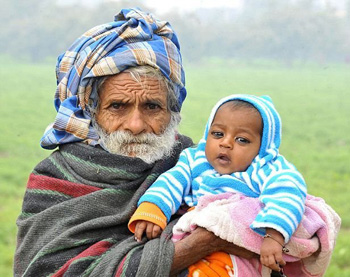Kharkhoda (Sonipat), October 16: Miracles happen and Ramajit Raghav is there to prove it. The farm hand claimed on Monday that he was the oldest person to father a child at the age of 96. What's more, he has done it for the second time in a gap of less than two years; Raghav was blessed with his first child in November 2010.
On October 5, Raghav's 52-year-old wife Shakuntala Devi gave birth to their second male child at a primary health centre in the town. The child is doing fine and is with his parents in their one-room accommodation on the city outskirts.

Raghav had expressed his desire for a second son soon after the birth of his first whom he named Vikramjeet. Although he was elated over birth of the second child, named Ranjeet, he has now decided to make his wife to undergo a tubectomy operation.
Claiming to have become a father at the oldest age, Raghav pointed out that he had remained a bachelor and practised celibacy throughout his life until he met Shakuntala about 10 years ago. "After staying together, we decided to extend our family and aspired for two sons. With God's grace, our wish has been fulfilled," said Raghav, sporting a thick unkempt beard.
In 2007, a Rajasthan man, 90-year-old Nanu Ram Jogi, had claimed to have been the oldest man to father a child, in his case his 21st child.
Raghav's age is recorded in the Haryana government's social welfare department as 96.
Talking about his daily routine, Raghav said, "I wake up at five in the morning and go to bed before 8pm. During the day, I work in the fields and also take 1-2 hour afternoon nap." He added his diet includes around two litres of cow's milk, fresh and green vegetables and chapattis.
Asked about the secret of his vitality, he said he had been a wrestler in his younger days when his daily diet comprised half a kg of munched almonds, equal measure of ghee and three litres of milk besides vegetables and chapattis. Raghav said he had been a teetotaller and a strict vegetarian throughout his life.
When contested about his age claim, Raghav countered strongly by vividly recollecting the happenings of a 1929 epidemic that killed many in Uttar Pradesh and later the post-Partition communal riots.
He told TOI that he originally belonged to Begpur village in UP, and left home about 40 years ago after a violent family dispute. Initially, he worked as a farm help in a village in Sonipat and later shifted to Kharkhoda where he has been living and working at the farm of his landlord Bhajan Bania for the past 22 years.
Carrying the newborn in her lap, Shakuntala appeared a concerned mother. "My husband earns a living by working in the fields. Besides, he gets Rs 500 as old age pension from the state government. This is insufficient to feed our children and family. We hope to educate them and do something good in life," she said.
A medical officer at the Kharkhoda PHC said the woman had a normal mother and baby were discharged in four hours.






Comments
Add new comment